Contemporary Management Issues and Entrepreneurial Strategies
VerifiedAdded on 2023/06/17
|8
|2412
|73
Essay
AI Summary
This essay delves into the contemporary management issues faced by entrepreneurial firms in the 21st century, particularly in light of market complexities and uncertainties. It examines entrepreneurial theories, drawing insights from the article "Causation and Effectuation: Toward A Theoretical Shift from Economic Inevitability to Entrepreneurial Contingency," to understand how managers can effectively navigate operational activities. The essay highlights the importance of risk management, innovation models like the Blue Ocean strategy, and the role of effective entrepreneurial theories in shaping business strategies. Furthermore, it emphasizes the significance of contingency plans in mitigating risks and ensuring business continuity in uncertain markets. The analysis concludes that proactive management and strategic planning are crucial for developing resilient and productive business operations in the modern business environment. Desklib provides access to this and many other solved assignments.
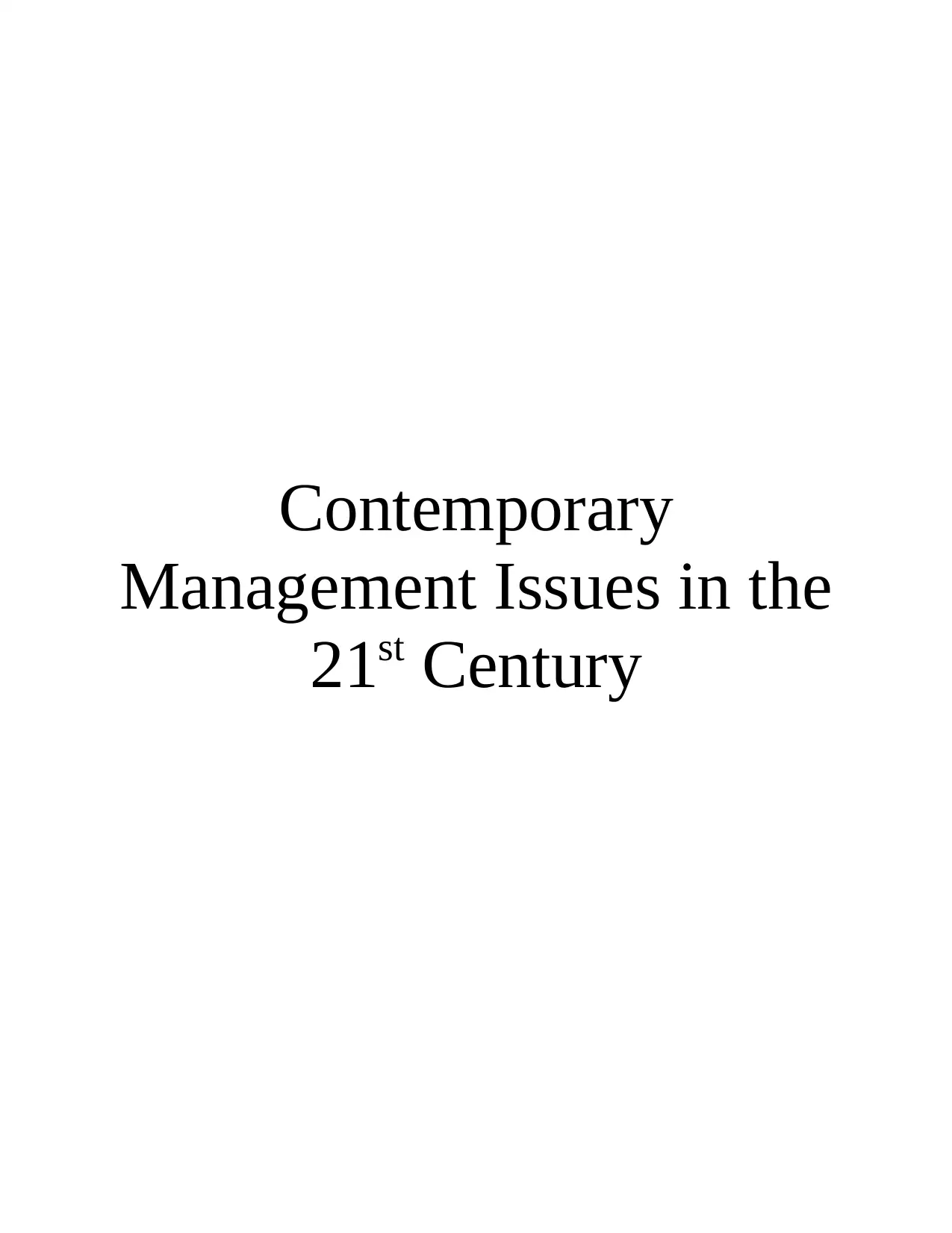
Contemporary
Management Issues in the
21st Century
Management Issues in the
21st Century
Paraphrase This Document
Need a fresh take? Get an instant paraphrase of this document with our AI Paraphraser
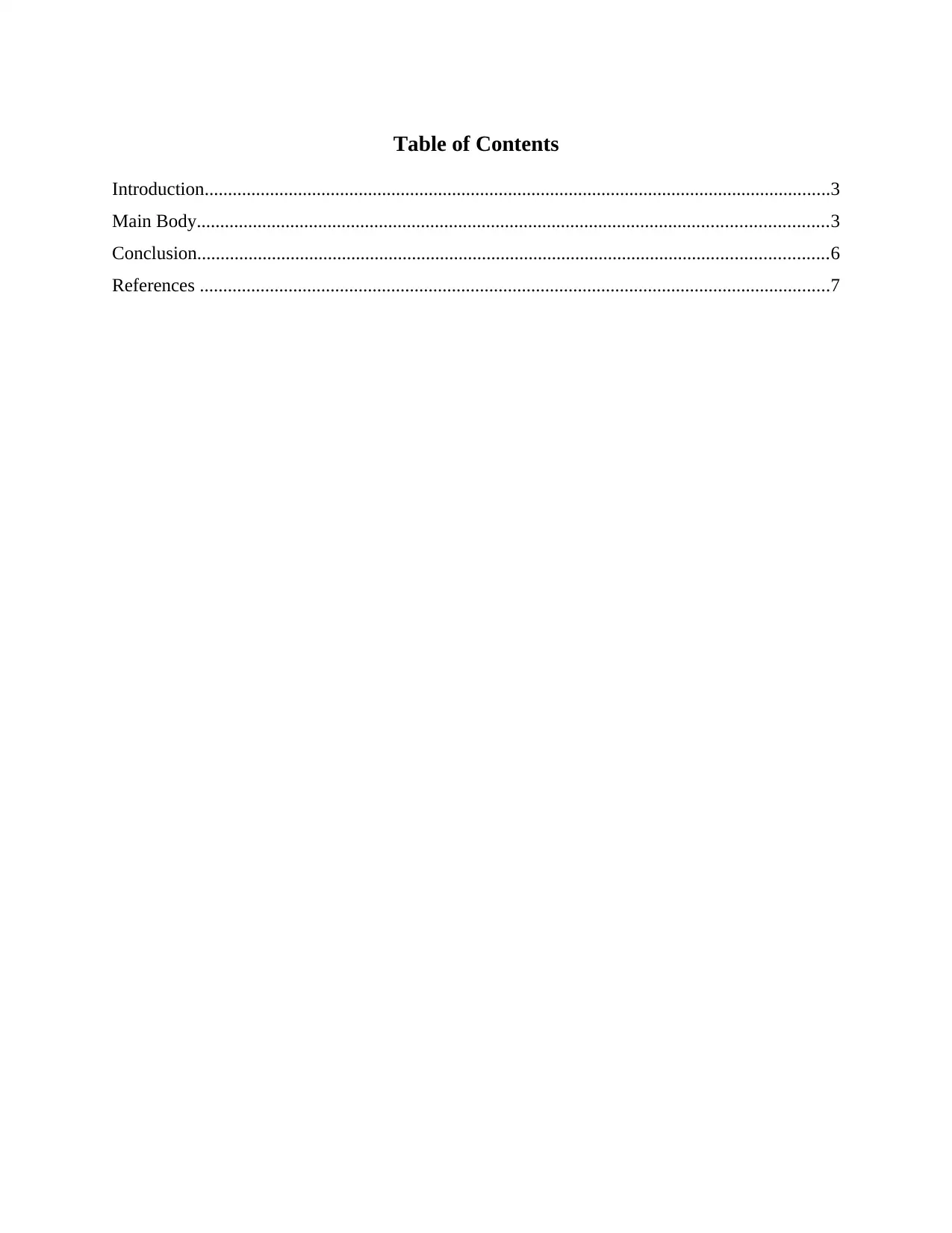
Table of Contents
Introduction......................................................................................................................................3
Main Body.......................................................................................................................................3
Conclusion.......................................................................................................................................6
References .......................................................................................................................................7
Introduction......................................................................................................................................3
Main Body.......................................................................................................................................3
Conclusion.......................................................................................................................................6
References .......................................................................................................................................7
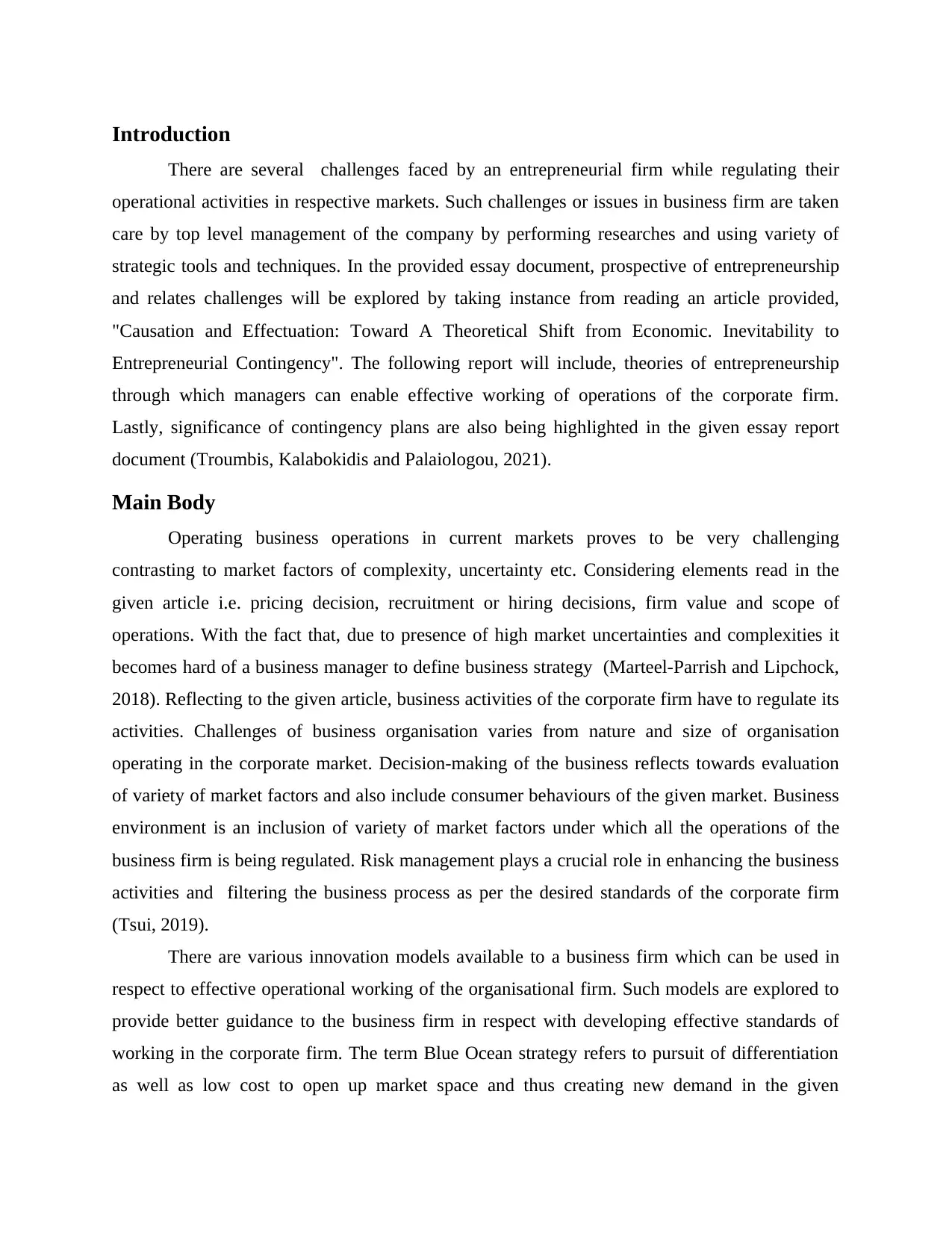
Introduction
There are several challenges faced by an entrepreneurial firm while regulating their
operational activities in respective markets. Such challenges or issues in business firm are taken
care by top level management of the company by performing researches and using variety of
strategic tools and techniques. In the provided essay document, prospective of entrepreneurship
and relates challenges will be explored by taking instance from reading an article provided,
"Causation and Effectuation: Toward A Theoretical Shift from Economic. Inevitability to
Entrepreneurial Contingency". The following report will include, theories of entrepreneurship
through which managers can enable effective working of operations of the corporate firm.
Lastly, significance of contingency plans are also being highlighted in the given essay report
document (Troumbis, Kalabokidis and Palaiologou, 2021).
Main Body
Operating business operations in current markets proves to be very challenging
contrasting to market factors of complexity, uncertainty etc. Considering elements read in the
given article i.e. pricing decision, recruitment or hiring decisions, firm value and scope of
operations. With the fact that, due to presence of high market uncertainties and complexities it
becomes hard of a business manager to define business strategy (Marteel-Parrish and Lipchock,
2018). Reflecting to the given article, business activities of the corporate firm have to regulate its
activities. Challenges of business organisation varies from nature and size of organisation
operating in the corporate market. Decision-making of the business reflects towards evaluation
of variety of market factors and also include consumer behaviours of the given market. Business
environment is an inclusion of variety of market factors under which all the operations of the
business firm is being regulated. Risk management plays a crucial role in enhancing the business
activities and filtering the business process as per the desired standards of the corporate firm
(Tsui, 2019).
There are various innovation models available to a business firm which can be used in
respect to effective operational working of the organisational firm. Such models are explored to
provide better guidance to the business firm in respect with developing effective standards of
working in the corporate firm. The term Blue Ocean strategy refers to pursuit of differentiation
as well as low cost to open up market space and thus creating new demand in the given
There are several challenges faced by an entrepreneurial firm while regulating their
operational activities in respective markets. Such challenges or issues in business firm are taken
care by top level management of the company by performing researches and using variety of
strategic tools and techniques. In the provided essay document, prospective of entrepreneurship
and relates challenges will be explored by taking instance from reading an article provided,
"Causation and Effectuation: Toward A Theoretical Shift from Economic. Inevitability to
Entrepreneurial Contingency". The following report will include, theories of entrepreneurship
through which managers can enable effective working of operations of the corporate firm.
Lastly, significance of contingency plans are also being highlighted in the given essay report
document (Troumbis, Kalabokidis and Palaiologou, 2021).
Main Body
Operating business operations in current markets proves to be very challenging
contrasting to market factors of complexity, uncertainty etc. Considering elements read in the
given article i.e. pricing decision, recruitment or hiring decisions, firm value and scope of
operations. With the fact that, due to presence of high market uncertainties and complexities it
becomes hard of a business manager to define business strategy (Marteel-Parrish and Lipchock,
2018). Reflecting to the given article, business activities of the corporate firm have to regulate its
activities. Challenges of business organisation varies from nature and size of organisation
operating in the corporate market. Decision-making of the business reflects towards evaluation
of variety of market factors and also include consumer behaviours of the given market. Business
environment is an inclusion of variety of market factors under which all the operations of the
business firm is being regulated. Risk management plays a crucial role in enhancing the business
activities and filtering the business process as per the desired standards of the corporate firm
(Tsui, 2019).
There are various innovation models available to a business firm which can be used in
respect to effective operational working of the organisational firm. Such models are explored to
provide better guidance to the business firm in respect with developing effective standards of
working in the corporate firm. The term Blue Ocean strategy refers to pursuit of differentiation
as well as low cost to open up market space and thus creating new demand in the given
⊘ This is a preview!⊘
Do you want full access?
Subscribe today to unlock all pages.

Trusted by 1+ million students worldwide
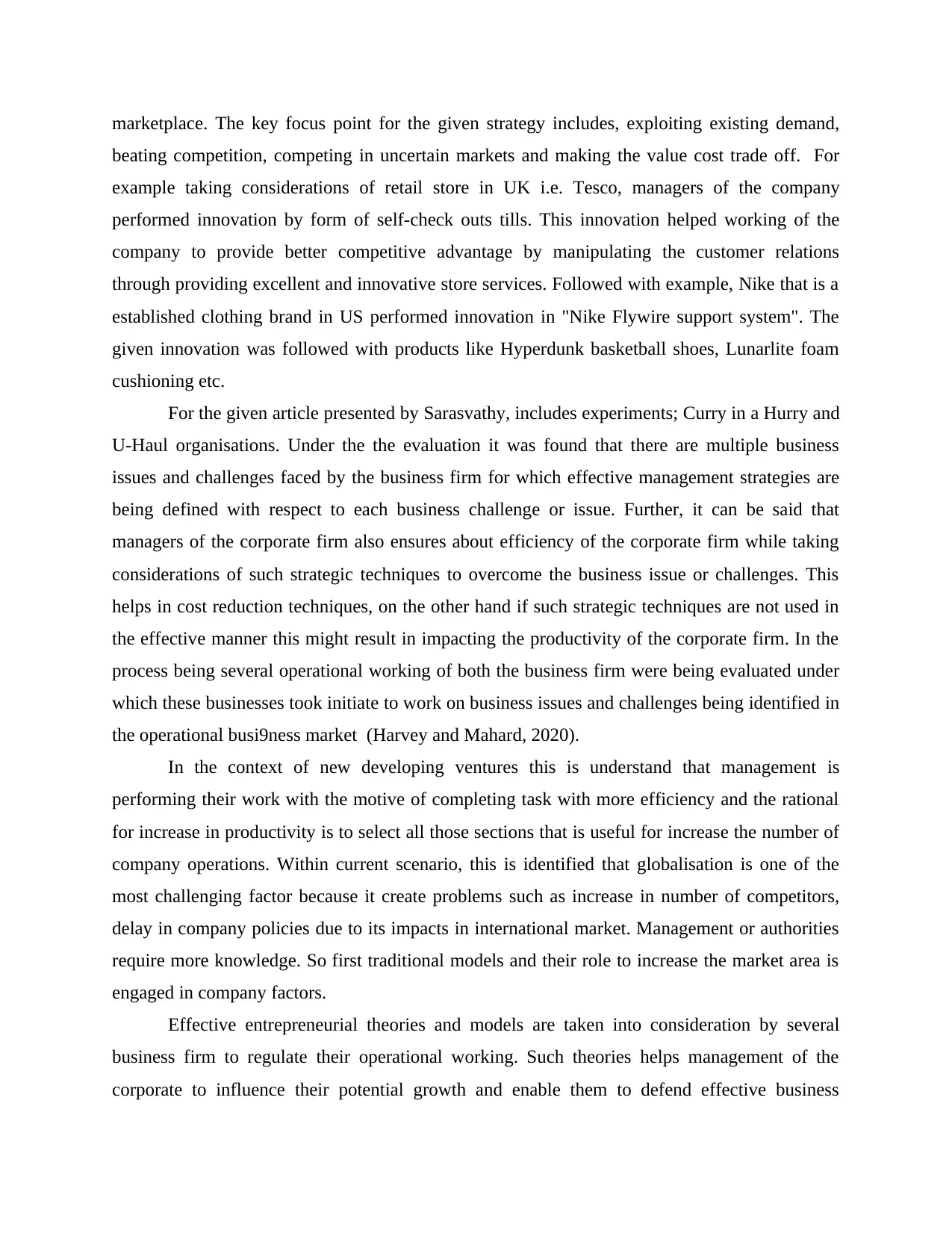
marketplace. The key focus point for the given strategy includes, exploiting existing demand,
beating competition, competing in uncertain markets and making the value cost trade off. For
example taking considerations of retail store in UK i.e. Tesco, managers of the company
performed innovation by form of self-check outs tills. This innovation helped working of the
company to provide better competitive advantage by manipulating the customer relations
through providing excellent and innovative store services. Followed with example, Nike that is a
established clothing brand in US performed innovation in "Nike Flywire support system". The
given innovation was followed with products like Hyperdunk basketball shoes, Lunarlite foam
cushioning etc.
For the given article presented by Sarasvathy, includes experiments; Curry in a Hurry and
U-Haul organisations. Under the the evaluation it was found that there are multiple business
issues and challenges faced by the business firm for which effective management strategies are
being defined with respect to each business challenge or issue. Further, it can be said that
managers of the corporate firm also ensures about efficiency of the corporate firm while taking
considerations of such strategic techniques to overcome the business issue or challenges. This
helps in cost reduction techniques, on the other hand if such strategic techniques are not used in
the effective manner this might result in impacting the productivity of the corporate firm. In the
process being several operational working of both the business firm were being evaluated under
which these businesses took initiate to work on business issues and challenges being identified in
the operational busi9ness market (Harvey and Mahard, 2020).
In the context of new developing ventures this is understand that management is
performing their work with the motive of completing task with more efficiency and the rational
for increase in productivity is to select all those sections that is useful for increase the number of
company operations. Within current scenario, this is identified that globalisation is one of the
most challenging factor because it create problems such as increase in number of competitors,
delay in company policies due to its impacts in international market. Management or authorities
require more knowledge. So first traditional models and their role to increase the market area is
engaged in company factors.
Effective entrepreneurial theories and models are taken into consideration by several
business firm to regulate their operational working. Such theories helps management of the
corporate to influence their potential growth and enable them to defend effective business
beating competition, competing in uncertain markets and making the value cost trade off. For
example taking considerations of retail store in UK i.e. Tesco, managers of the company
performed innovation by form of self-check outs tills. This innovation helped working of the
company to provide better competitive advantage by manipulating the customer relations
through providing excellent and innovative store services. Followed with example, Nike that is a
established clothing brand in US performed innovation in "Nike Flywire support system". The
given innovation was followed with products like Hyperdunk basketball shoes, Lunarlite foam
cushioning etc.
For the given article presented by Sarasvathy, includes experiments; Curry in a Hurry and
U-Haul organisations. Under the the evaluation it was found that there are multiple business
issues and challenges faced by the business firm for which effective management strategies are
being defined with respect to each business challenge or issue. Further, it can be said that
managers of the corporate firm also ensures about efficiency of the corporate firm while taking
considerations of such strategic techniques to overcome the business issue or challenges. This
helps in cost reduction techniques, on the other hand if such strategic techniques are not used in
the effective manner this might result in impacting the productivity of the corporate firm. In the
process being several operational working of both the business firm were being evaluated under
which these businesses took initiate to work on business issues and challenges being identified in
the operational busi9ness market (Harvey and Mahard, 2020).
In the context of new developing ventures this is understand that management is
performing their work with the motive of completing task with more efficiency and the rational
for increase in productivity is to select all those sections that is useful for increase the number of
company operations. Within current scenario, this is identified that globalisation is one of the
most challenging factor because it create problems such as increase in number of competitors,
delay in company policies due to its impacts in international market. Management or authorities
require more knowledge. So first traditional models and their role to increase the market area is
engaged in company factors.
Effective entrepreneurial theories and models are taken into consideration by several
business firm to regulate their operational working. Such theories helps management of the
corporate to influence their potential growth and enable them to defend effective business
Paraphrase This Document
Need a fresh take? Get an instant paraphrase of this document with our AI Paraphraser
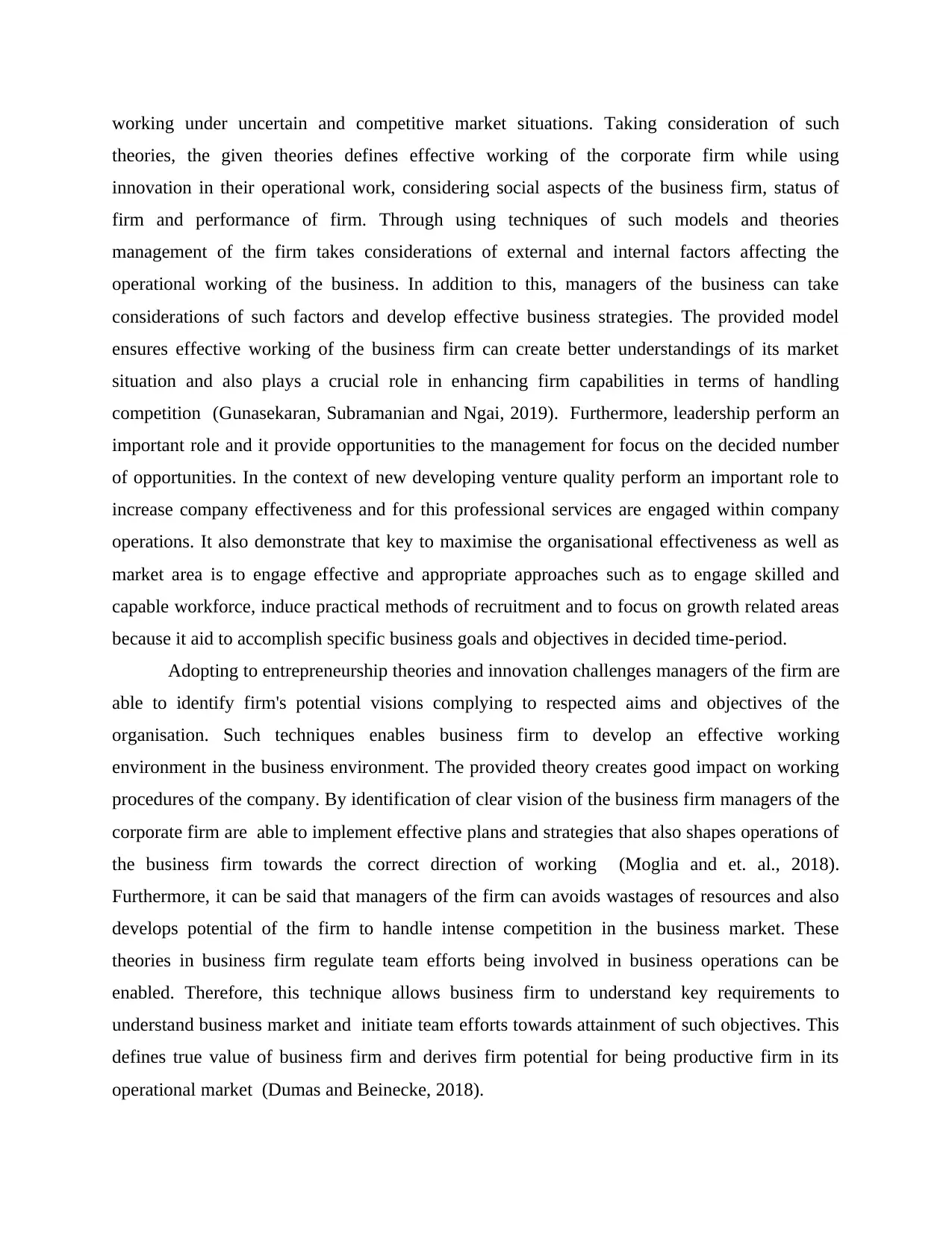
working under uncertain and competitive market situations. Taking consideration of such
theories, the given theories defines effective working of the corporate firm while using
innovation in their operational work, considering social aspects of the business firm, status of
firm and performance of firm. Through using techniques of such models and theories
management of the firm takes considerations of external and internal factors affecting the
operational working of the business. In addition to this, managers of the business can take
considerations of such factors and develop effective business strategies. The provided model
ensures effective working of the business firm can create better understandings of its market
situation and also plays a crucial role in enhancing firm capabilities in terms of handling
competition (Gunasekaran, Subramanian and Ngai, 2019). Furthermore, leadership perform an
important role and it provide opportunities to the management for focus on the decided number
of opportunities. In the context of new developing venture quality perform an important role to
increase company effectiveness and for this professional services are engaged within company
operations. It also demonstrate that key to maximise the organisational effectiveness as well as
market area is to engage effective and appropriate approaches such as to engage skilled and
capable workforce, induce practical methods of recruitment and to focus on growth related areas
because it aid to accomplish specific business goals and objectives in decided time-period.
Adopting to entrepreneurship theories and innovation challenges managers of the firm are
able to identify firm's potential visions complying to respected aims and objectives of the
organisation. Such techniques enables business firm to develop an effective working
environment in the business environment. The provided theory creates good impact on working
procedures of the company. By identification of clear vision of the business firm managers of the
corporate firm are able to implement effective plans and strategies that also shapes operations of
the business firm towards the correct direction of working (Moglia and et. al., 2018).
Furthermore, it can be said that managers of the firm can avoids wastages of resources and also
develops potential of the firm to handle intense competition in the business market. These
theories in business firm regulate team efforts being involved in business operations can be
enabled. Therefore, this technique allows business firm to understand key requirements to
understand business market and initiate team efforts towards attainment of such objectives. This
defines true value of business firm and derives firm potential for being productive firm in its
operational market (Dumas and Beinecke, 2018).
theories, the given theories defines effective working of the corporate firm while using
innovation in their operational work, considering social aspects of the business firm, status of
firm and performance of firm. Through using techniques of such models and theories
management of the firm takes considerations of external and internal factors affecting the
operational working of the business. In addition to this, managers of the business can take
considerations of such factors and develop effective business strategies. The provided model
ensures effective working of the business firm can create better understandings of its market
situation and also plays a crucial role in enhancing firm capabilities in terms of handling
competition (Gunasekaran, Subramanian and Ngai, 2019). Furthermore, leadership perform an
important role and it provide opportunities to the management for focus on the decided number
of opportunities. In the context of new developing venture quality perform an important role to
increase company effectiveness and for this professional services are engaged within company
operations. It also demonstrate that key to maximise the organisational effectiveness as well as
market area is to engage effective and appropriate approaches such as to engage skilled and
capable workforce, induce practical methods of recruitment and to focus on growth related areas
because it aid to accomplish specific business goals and objectives in decided time-period.
Adopting to entrepreneurship theories and innovation challenges managers of the firm are
able to identify firm's potential visions complying to respected aims and objectives of the
organisation. Such techniques enables business firm to develop an effective working
environment in the business environment. The provided theory creates good impact on working
procedures of the company. By identification of clear vision of the business firm managers of the
corporate firm are able to implement effective plans and strategies that also shapes operations of
the business firm towards the correct direction of working (Moglia and et. al., 2018).
Furthermore, it can be said that managers of the firm can avoids wastages of resources and also
develops potential of the firm to handle intense competition in the business market. These
theories in business firm regulate team efforts being involved in business operations can be
enabled. Therefore, this technique allows business firm to understand key requirements to
understand business market and initiate team efforts towards attainment of such objectives. This
defines true value of business firm and derives firm potential for being productive firm in its
operational market (Dumas and Beinecke, 2018).
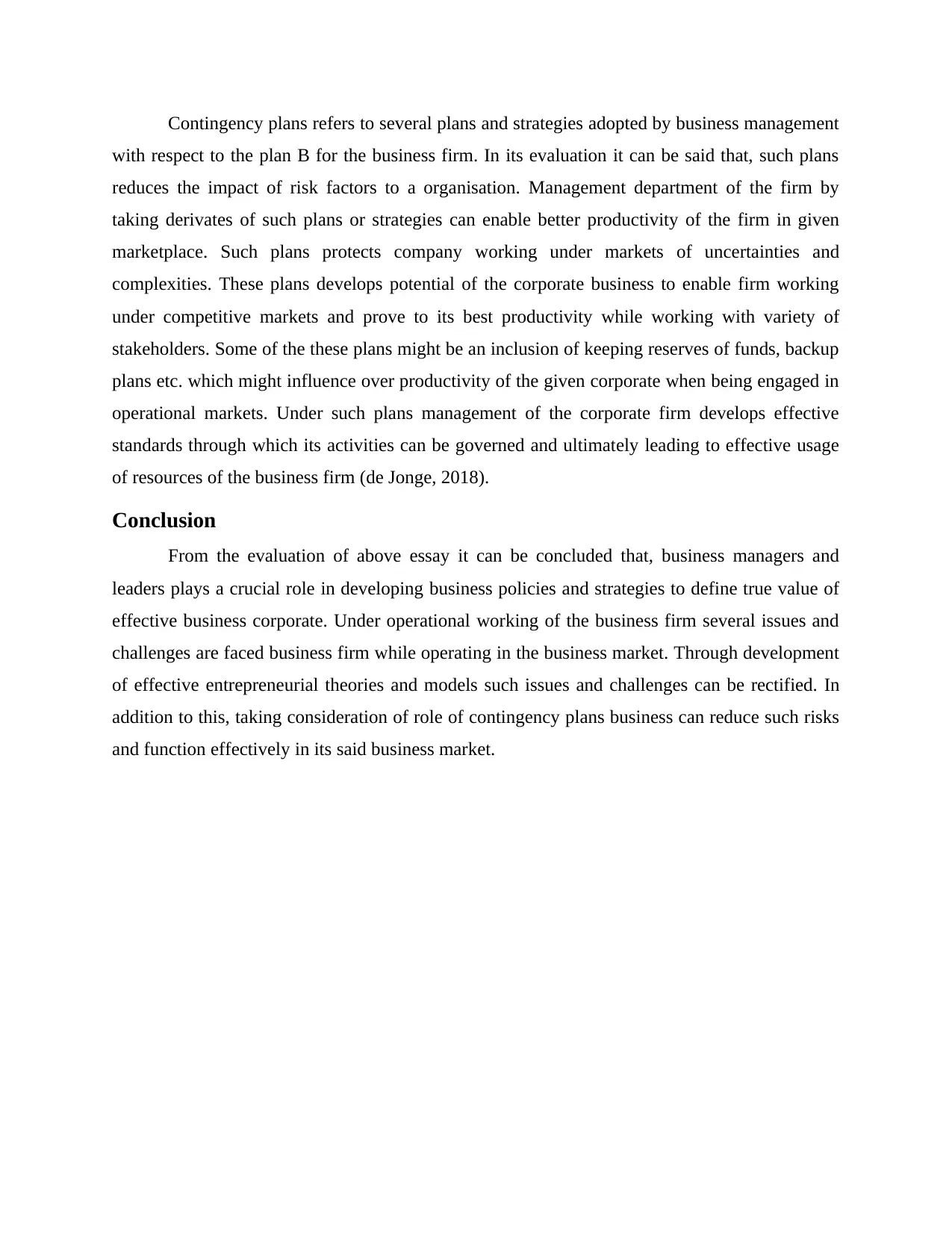
Contingency plans refers to several plans and strategies adopted by business management
with respect to the plan B for the business firm. In its evaluation it can be said that, such plans
reduces the impact of risk factors to a organisation. Management department of the firm by
taking derivates of such plans or strategies can enable better productivity of the firm in given
marketplace. Such plans protects company working under markets of uncertainties and
complexities. These plans develops potential of the corporate business to enable firm working
under competitive markets and prove to its best productivity while working with variety of
stakeholders. Some of the these plans might be an inclusion of keeping reserves of funds, backup
plans etc. which might influence over productivity of the given corporate when being engaged in
operational markets. Under such plans management of the corporate firm develops effective
standards through which its activities can be governed and ultimately leading to effective usage
of resources of the business firm (de Jonge, 2018).
Conclusion
From the evaluation of above essay it can be concluded that, business managers and
leaders plays a crucial role in developing business policies and strategies to define true value of
effective business corporate. Under operational working of the business firm several issues and
challenges are faced business firm while operating in the business market. Through development
of effective entrepreneurial theories and models such issues and challenges can be rectified. In
addition to this, taking consideration of role of contingency plans business can reduce such risks
and function effectively in its said business market.
with respect to the plan B for the business firm. In its evaluation it can be said that, such plans
reduces the impact of risk factors to a organisation. Management department of the firm by
taking derivates of such plans or strategies can enable better productivity of the firm in given
marketplace. Such plans protects company working under markets of uncertainties and
complexities. These plans develops potential of the corporate business to enable firm working
under competitive markets and prove to its best productivity while working with variety of
stakeholders. Some of the these plans might be an inclusion of keeping reserves of funds, backup
plans etc. which might influence over productivity of the given corporate when being engaged in
operational markets. Under such plans management of the corporate firm develops effective
standards through which its activities can be governed and ultimately leading to effective usage
of resources of the business firm (de Jonge, 2018).
Conclusion
From the evaluation of above essay it can be concluded that, business managers and
leaders plays a crucial role in developing business policies and strategies to define true value of
effective business corporate. Under operational working of the business firm several issues and
challenges are faced business firm while operating in the business market. Through development
of effective entrepreneurial theories and models such issues and challenges can be rectified. In
addition to this, taking consideration of role of contingency plans business can reduce such risks
and function effectively in its said business market.
⊘ This is a preview!⊘
Do you want full access?
Subscribe today to unlock all pages.

Trusted by 1+ million students worldwide
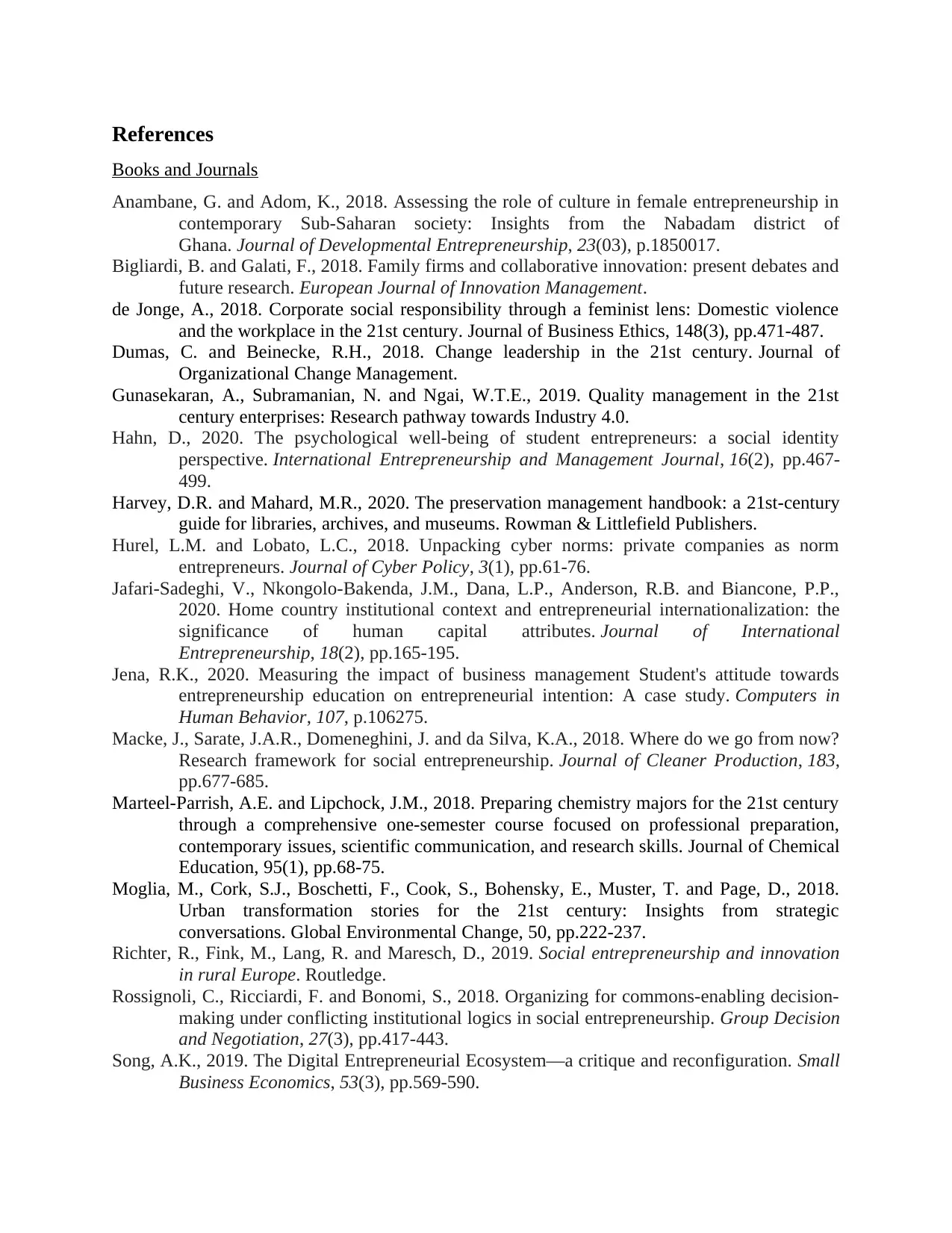
References
Books and Journals
Anambane, G. and Adom, K., 2018. Assessing the role of culture in female entrepreneurship in
contemporary Sub-Saharan society: Insights from the Nabadam district of
Ghana. Journal of Developmental Entrepreneurship, 23(03), p.1850017.
Bigliardi, B. and Galati, F., 2018. Family firms and collaborative innovation: present debates and
future research. European Journal of Innovation Management.
de Jonge, A., 2018. Corporate social responsibility through a feminist lens: Domestic violence
and the workplace in the 21st century. Journal of Business Ethics, 148(3), pp.471-487.
Dumas, C. and Beinecke, R.H., 2018. Change leadership in the 21st century. Journal of
Organizational Change Management.
Gunasekaran, A., Subramanian, N. and Ngai, W.T.E., 2019. Quality management in the 21st
century enterprises: Research pathway towards Industry 4.0.
Hahn, D., 2020. The psychological well-being of student entrepreneurs: a social identity
perspective. International Entrepreneurship and Management Journal, 16(2), pp.467-
499.
Harvey, D.R. and Mahard, M.R., 2020. The preservation management handbook: a 21st-century
guide for libraries, archives, and museums. Rowman & Littlefield Publishers.
Hurel, L.M. and Lobato, L.C., 2018. Unpacking cyber norms: private companies as norm
entrepreneurs. Journal of Cyber Policy, 3(1), pp.61-76.
Jafari-Sadeghi, V., Nkongolo-Bakenda, J.M., Dana, L.P., Anderson, R.B. and Biancone, P.P.,
2020. Home country institutional context and entrepreneurial internationalization: the
significance of human capital attributes. Journal of International
Entrepreneurship, 18(2), pp.165-195.
Jena, R.K., 2020. Measuring the impact of business management Student's attitude towards
entrepreneurship education on entrepreneurial intention: A case study. Computers in
Human Behavior, 107, p.106275.
Macke, J., Sarate, J.A.R., Domeneghini, J. and da Silva, K.A., 2018. Where do we go from now?
Research framework for social entrepreneurship. Journal of Cleaner Production, 183,
pp.677-685.
Marteel-Parrish, A.E. and Lipchock, J.M., 2018. Preparing chemistry majors for the 21st century
through a comprehensive one-semester course focused on professional preparation,
contemporary issues, scientific communication, and research skills. Journal of Chemical
Education, 95(1), pp.68-75.
Moglia, M., Cork, S.J., Boschetti, F., Cook, S., Bohensky, E., Muster, T. and Page, D., 2018.
Urban transformation stories for the 21st century: Insights from strategic
conversations. Global Environmental Change, 50, pp.222-237.
Richter, R., Fink, M., Lang, R. and Maresch, D., 2019. Social entrepreneurship and innovation
in rural Europe. Routledge.
Rossignoli, C., Ricciardi, F. and Bonomi, S., 2018. Organizing for commons-enabling decision-
making under conflicting institutional logics in social entrepreneurship. Group Decision
and Negotiation, 27(3), pp.417-443.
Song, A.K., 2019. The Digital Entrepreneurial Ecosystem—a critique and reconfiguration. Small
Business Economics, 53(3), pp.569-590.
Books and Journals
Anambane, G. and Adom, K., 2018. Assessing the role of culture in female entrepreneurship in
contemporary Sub-Saharan society: Insights from the Nabadam district of
Ghana. Journal of Developmental Entrepreneurship, 23(03), p.1850017.
Bigliardi, B. and Galati, F., 2018. Family firms and collaborative innovation: present debates and
future research. European Journal of Innovation Management.
de Jonge, A., 2018. Corporate social responsibility through a feminist lens: Domestic violence
and the workplace in the 21st century. Journal of Business Ethics, 148(3), pp.471-487.
Dumas, C. and Beinecke, R.H., 2018. Change leadership in the 21st century. Journal of
Organizational Change Management.
Gunasekaran, A., Subramanian, N. and Ngai, W.T.E., 2019. Quality management in the 21st
century enterprises: Research pathway towards Industry 4.0.
Hahn, D., 2020. The psychological well-being of student entrepreneurs: a social identity
perspective. International Entrepreneurship and Management Journal, 16(2), pp.467-
499.
Harvey, D.R. and Mahard, M.R., 2020. The preservation management handbook: a 21st-century
guide for libraries, archives, and museums. Rowman & Littlefield Publishers.
Hurel, L.M. and Lobato, L.C., 2018. Unpacking cyber norms: private companies as norm
entrepreneurs. Journal of Cyber Policy, 3(1), pp.61-76.
Jafari-Sadeghi, V., Nkongolo-Bakenda, J.M., Dana, L.P., Anderson, R.B. and Biancone, P.P.,
2020. Home country institutional context and entrepreneurial internationalization: the
significance of human capital attributes. Journal of International
Entrepreneurship, 18(2), pp.165-195.
Jena, R.K., 2020. Measuring the impact of business management Student's attitude towards
entrepreneurship education on entrepreneurial intention: A case study. Computers in
Human Behavior, 107, p.106275.
Macke, J., Sarate, J.A.R., Domeneghini, J. and da Silva, K.A., 2018. Where do we go from now?
Research framework for social entrepreneurship. Journal of Cleaner Production, 183,
pp.677-685.
Marteel-Parrish, A.E. and Lipchock, J.M., 2018. Preparing chemistry majors for the 21st century
through a comprehensive one-semester course focused on professional preparation,
contemporary issues, scientific communication, and research skills. Journal of Chemical
Education, 95(1), pp.68-75.
Moglia, M., Cork, S.J., Boschetti, F., Cook, S., Bohensky, E., Muster, T. and Page, D., 2018.
Urban transformation stories for the 21st century: Insights from strategic
conversations. Global Environmental Change, 50, pp.222-237.
Richter, R., Fink, M., Lang, R. and Maresch, D., 2019. Social entrepreneurship and innovation
in rural Europe. Routledge.
Rossignoli, C., Ricciardi, F. and Bonomi, S., 2018. Organizing for commons-enabling decision-
making under conflicting institutional logics in social entrepreneurship. Group Decision
and Negotiation, 27(3), pp.417-443.
Song, A.K., 2019. The Digital Entrepreneurial Ecosystem—a critique and reconfiguration. Small
Business Economics, 53(3), pp.569-590.
Paraphrase This Document
Need a fresh take? Get an instant paraphrase of this document with our AI Paraphraser
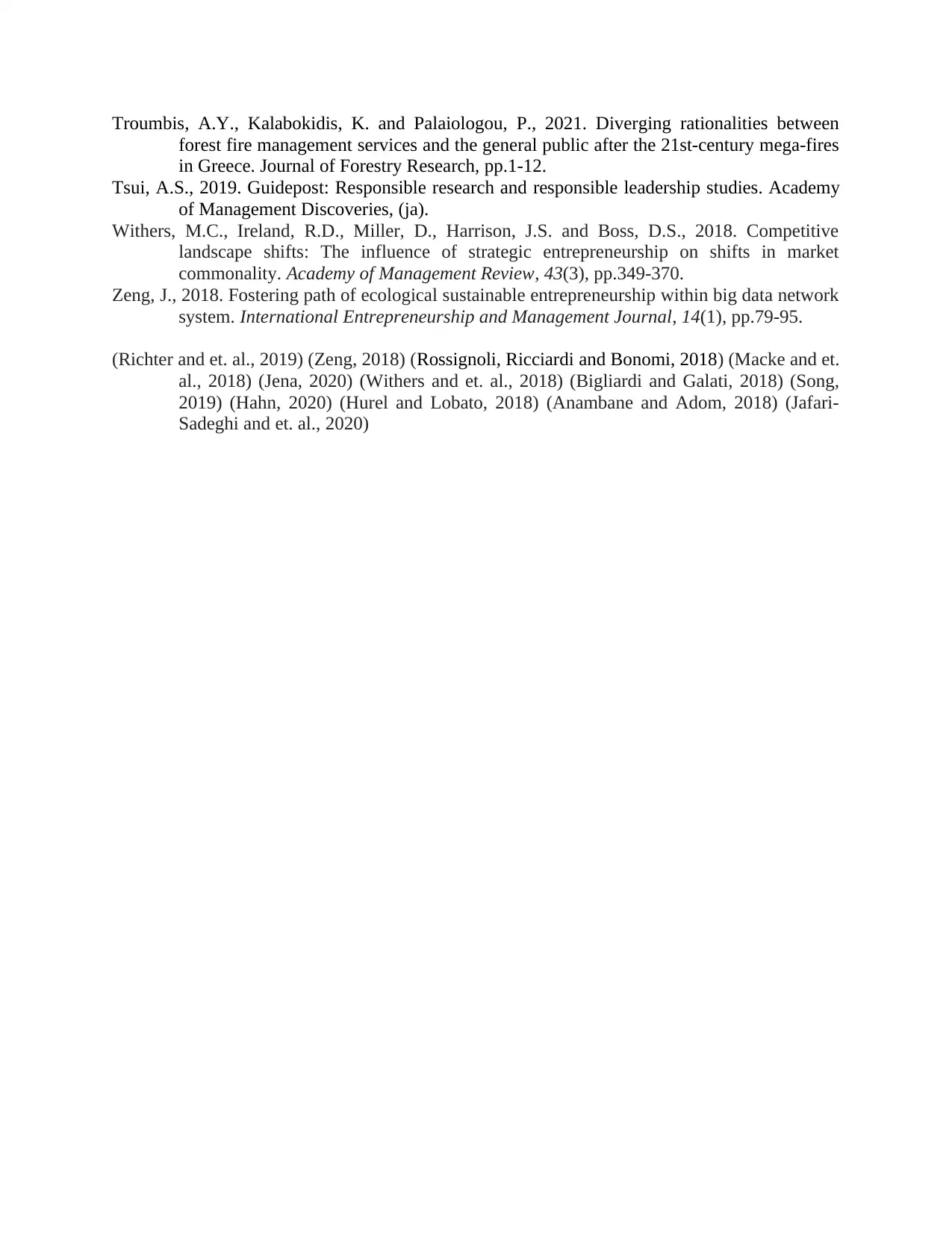
Troumbis, A.Y., Kalabokidis, K. and Palaiologou, P., 2021. Diverging rationalities between
forest fire management services and the general public after the 21st-century mega-fires
in Greece. Journal of Forestry Research, pp.1-12.
Tsui, A.S., 2019. Guidepost: Responsible research and responsible leadership studies. Academy
of Management Discoveries, (ja).
Withers, M.C., Ireland, R.D., Miller, D., Harrison, J.S. and Boss, D.S., 2018. Competitive
landscape shifts: The influence of strategic entrepreneurship on shifts in market
commonality. Academy of Management Review, 43(3), pp.349-370.
Zeng, J., 2018. Fostering path of ecological sustainable entrepreneurship within big data network
system. International Entrepreneurship and Management Journal, 14(1), pp.79-95.
(Richter and et. al., 2019) (Zeng, 2018) (Rossignoli, Ricciardi and Bonomi, 2018) (Macke and et.
al., 2018) (Jena, 2020) (Withers and et. al., 2018) (Bigliardi and Galati, 2018) (Song,
2019) (Hahn, 2020) (Hurel and Lobato, 2018) (Anambane and Adom, 2018) (Jafari-
Sadeghi and et. al., 2020)
forest fire management services and the general public after the 21st-century mega-fires
in Greece. Journal of Forestry Research, pp.1-12.
Tsui, A.S., 2019. Guidepost: Responsible research and responsible leadership studies. Academy
of Management Discoveries, (ja).
Withers, M.C., Ireland, R.D., Miller, D., Harrison, J.S. and Boss, D.S., 2018. Competitive
landscape shifts: The influence of strategic entrepreneurship on shifts in market
commonality. Academy of Management Review, 43(3), pp.349-370.
Zeng, J., 2018. Fostering path of ecological sustainable entrepreneurship within big data network
system. International Entrepreneurship and Management Journal, 14(1), pp.79-95.
(Richter and et. al., 2019) (Zeng, 2018) (Rossignoli, Ricciardi and Bonomi, 2018) (Macke and et.
al., 2018) (Jena, 2020) (Withers and et. al., 2018) (Bigliardi and Galati, 2018) (Song,
2019) (Hahn, 2020) (Hurel and Lobato, 2018) (Anambane and Adom, 2018) (Jafari-
Sadeghi and et. al., 2020)
1 out of 8
Related Documents
Your All-in-One AI-Powered Toolkit for Academic Success.
+13062052269
info@desklib.com
Available 24*7 on WhatsApp / Email
![[object Object]](/_next/static/media/star-bottom.7253800d.svg)
Unlock your academic potential
Copyright © 2020–2026 A2Z Services. All Rights Reserved. Developed and managed by ZUCOL.



